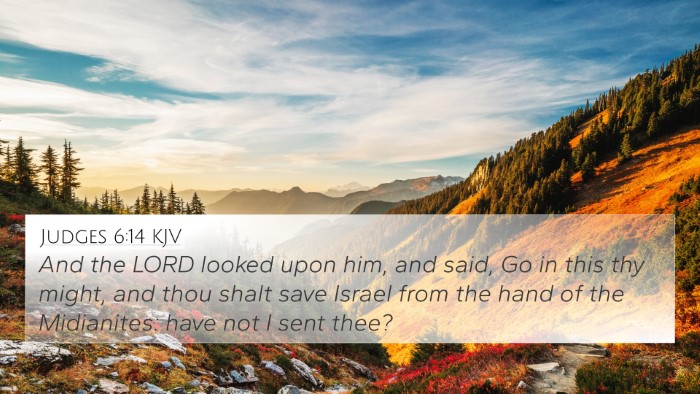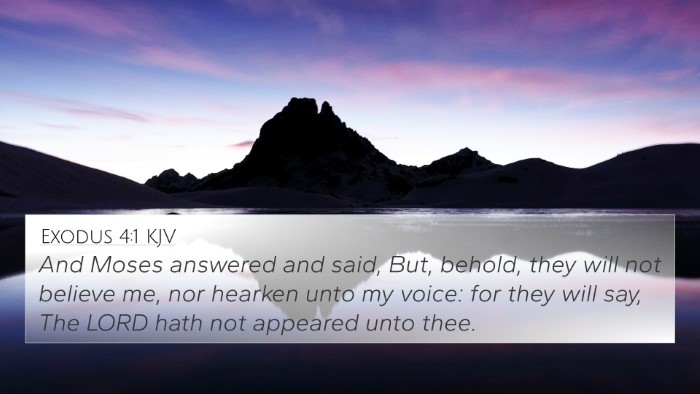Understanding Judges 6:36
Judges 6:36 states, "Then Gideon said to God, 'If you will save Israel by my hand as you have promised...'" This verse is significant as it reflects Gideon's quest for assurance from God before stepping into his role as a leader and deliverer for Israel. Below is a summary of the insights drawn from various public domain commentaries.
Contextual Significance
Gideon was called by God to save Israel from the oppression of the Midianites. His request for a sign indicated both his faith and his doubt, illustrating a common human experience of seeking confirmation from God before acting.
Insights from Commentaries
- Matthew Henry: Henry emphasizes that Gideon's asking for a sign was not mere skepticism, but a plea for divine confirmation. This demonstrates God's patience and understanding of human frailty.
- Albert Barnes: Barnes points out the significance of Gideon’s faith journey; he recognizes the need for God’s assurance to fulfill his mission. Barnes also highlights the overwhelming pressure Gideon faced, which fueled his desire for divine reassurance.
- Adam Clarke: Clarke notes that Gideon's request was reasonable considering the challenging circumstances. He interprets this as a personal interaction with God, showcasing the relational aspect of faith where God meets individuals at their point of need.
Thematic Connections
This verse connects not only to the narrative of Gideon but also to broader biblical themes such as faith, doubt, and God’s willingness to provide signs to His people. Here are some connecting ideas:
Bible Verse Cross-References
- 1 Samuel 10:7: "But let it be, when these signs come to you, that you do as the occasion demands; for God is with you." This verse shows Samuel affirming that God gives signs for assurance in leadership.
- Judges 7:14: "His friend answered and said, 'This is nothing else but the sword of Gideon, the son of Joash, a man of Israel!'" A sign confirming Gideon’s role and the victory.
- Matthew 12:38-39: "Then some of the scribes and Pharisees answered, saying, 'Teacher, we want to see a sign from You.' But He answered and said to them, 'An evil and adulterous generation seeks after a sign...'" Illustrates seeking signs in faith.
- 2 Kings 20:8: "And Hezekiah said to Isaiah, 'What is the sign that the Lord will heal me...'" Indicates another instance where a leader asks for confirmation from God.
- Luke 1:18: "And Zechariah said to the angel, 'How shall I know this? For I am an old man, and my wife is well advanced in years.'" Reflects the pattern of human doubt even in divine encounters.
- Exodus 4:1: "Then Moses answered and said, 'But suppose they will not believe me or listen to my voice; suppose they say, 'The Lord has not appeared to you.'" God's response involved providing signs to Moses.
- Mark 16:17-18: "And these signs will follow those who believe: In My name they will cast out demons..." Highlights the theme of signs as confirmations of faith.
Interpreting the Verse through Cross-Referencing
When interpreting Judges 6:36, it is essential to consider how it reflects God's willingness to confirm His word and promises through tangible signs. The exploration of Gideon's story alongside other biblical instances illustrates that doubts encountered by faithful leaders are not uncommon, nor does God dismiss them. Instead, He often responds with understanding and provision.
Applications for Believers
For contemporary believers, this verse encourages the application of faith in asking for divine guidance. It can be seen as an invitation to cultivate a deeper relationship with God, recognizing that it’s normal to seek clarification in times of uncertainty.
Conclusion
The story of Gideon in Judges 6:36 serves as a profound reminder of God's grace towards our doubts and His readiness to affirm His promises. Through cross-referencing biblical texts, we can see the thematic and narrative connections that enrich our understanding of this pivotal moment in Israel’s history.








